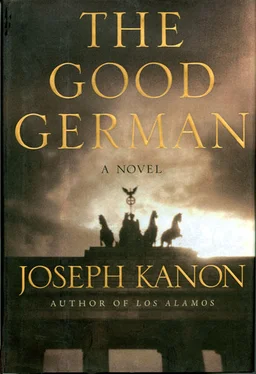They waited on the crowded platform, open to the sky through a rib cage of twisted girders. Fleischman had brought another woman to help, and while she and Lena talked, Jake leaned back against a pillar, smoking and watching the crowd. People sitting around in clumps, dispirited, holding on to rucksacks and bags, the usual station clamor slowed to a kind of listless stupor. A pack of teenage boys, feral, looking for something to snatch. A Russian soldier wandering up and down, probably after a girl. Tired women. Everything ordinary, what passed for peace. He remembered his going-away party, the platform alive with champagne and crisp uniforms, Renate winking, getting away with something.
“How is it you speak German?” Fleischman asked, something polite to pass the time.
“I used to live in Berlin.”
“Ah. Do you know Texas?”
“Texas?”
“Well, forgive me. An American. Of course, it’s a large country. There’s a church, you see. Fredericksburg, Texas. A Lutheran church, so I think maybe German people once. They’ve offered to take some of the children. Of course, it’s a chance for them. A future. But to send them so far, after everything-I don’t know. How do I select?”
“How many do they want?”
“Five. They can take five.” He sighed. “Now we send our children. Well, God will take care of them.”
Just as he did here, Jake thought, looking at the scorched wall.
“They’re orphans?”
Fleischman nodded. “From the Sudeten. The parents were killed during the expulsion. Then Silesia. Now here. Tomorrow, who knows? Cowboys.”
“I’m sure they’re good people, if they offered.”
“Yes, yes, I know. It’s the selection. How do I select?”
He moved away, not expecting an answer, before Jake could say anything. Names in a hat. Outside, the light was fading. People were still milling aimlessly. The train was now an hour late.
“I’m sorry,” Lena said. “I didn’t know. Do you want to leave?”
“No, I’m fine. Here, sit. Get some rest.” He sank to the bottom of the pillar, pulling her down with him, her head against his shoulder.
“It’s boring for you.”
“No, gives me time to think.”
But what he thought about, his mind drifting in the half wakeful-ness of waiting, was the cards, eyes facing in two directions. Deception. Nonsense. He wished he had a crossword puzzle, where one clue led to another, rational. A man gets on a plane, one across. With no baggage but a piece of information, the one thing you didn’t have to carry. Worth money. Russian. So information to a Russian. In Potsdam. Where he’s dead by nightfall. How did he spend the rest of the day? Not looking for Emil. But neither was the Russian at Professor Brandt’s. A possibility, Gunther had said, they already know where he is. But then who wanted Tully dead? Not the paymaster, presumably, or why pay in the first place? Maybe he just got in the way. Whose?
His head dropped onto his chest, nudging his eyes open. For a second he wondered if he was really awake. The station had grown black, dotted with harsh little pools of light from a row of bare bulbs strung between the pillars, a dream landscape where things crept in the dark. Lena was still leaning against him, breathing softly, safe. He closed his eyes. You couldn’t solve a crossword without the key. No matter which way he worked it, the central piece was always Emil, who knew where the columns met. Without him, it was just tea leaves, the chance arrangement of cards. Sometimes they surprise even me. But people heard what they wanted to hear.
The shriek of the train whistle woke everybody. People scrambled to their feet, the dim rails growing brighter as the engine headlight inched its way toward the platform, as if the weight were too much for the engine to pull. People covered the roofs of the cars and hung along the sides, perched on running boards or just holding on to whatever piece of metal was available, like the trains he’d seen in Egypt, bursting with fellaheen. A few boxcars with feet dangling from the open sliding doors. Everyone worn and stiff, so that when they dropped onto the platform they moved slowly, awkward with cramps. A hiss, finally, of exhausted steam, and a clang of brakes. Now the platform crowd moved forward with their bundles, shoving to get on even before the train had emptied. In the confusion, Pastor Fleischman was running back and forth, trying to locate his charges. He waved Lena over. Frau Schaller, the other helper, was already lifting children off the train.
Their heads had been shaved for delousing, skeletal. Short pants, legs like sticks, slips of paper hanging on strings around their necks as makeshift IDs, faces dazed. As people pushed around them, they stood fixed, blinking. A few had dark blotches on their skin.
“Look at that. Have they been beaten?” Jake said.
“No, it’s the edema. From no food. Any sore will bruise.”
Pastor Fleischman began loading the smaller ones into the handcart while the others looked on blankly, huddled together. No luggage. A little girl with mucus crusted under her nose. Another story Collier’s would never run-who had really lost the war.
Jake leaned over to help with the loading, reaching for one of the younger boys, but the child reared back, screaming, “ Nein! Nein!” Some of the platform crowd turned in alarm. Lena stepped between them, bent down, and spoke softly to the boy. She looked back over her shoulder at Jake.
“It’s the uniform. He’s afraid of soldiers. Say something in German.”
“I only want to help,” Jake said to him. “But you can go with the lady if you like.”
The boy stared at him, then hid behind Lena.
“It’s like this sometimes,” she said, apologetic. “Any uniform.”
Jake turned to another child. “Are you afraid of me?”
“No. Kurt’s afraid. He’s young. See how he wet himself?” Then he pointed to Jake’s pocket. “Do you have chocolate?”
“Not today. I’m sorry. I’ll bring you some tomorrow.”
The boy looked down-too long away to imagine.
Frau Schaller had opened a bag and was handing out chunks of bread, which the children held to their chests as they ate. They began moving down the platform, Pastor Fleischman pulling the cart, the others straggling behind, Lena and Frau Schaller herding from the rear. The older children were looking around, eyes wide. Not the Berlin they’d heard about all their lives, Ku’damm lights and leafy boulevards. Instead, swarms of refugees and fire-blackened walls and, through the arches, dark mounds of brick. But the grown-ups were reacting in the same way, literally staggering through the doors. Now that they were here, where did they go? Jake thought of the weary DPs in the Tiergarten that first day, just moving.
They managed to squeeze the youngest group into the jeep, Lena holding the boy who’d wet himself. The nursery was in a church in Schoneberg, and before they were halfway there the children had begun to nod off, back in the rocking motion of the train. No sense of where they were, the streets a maze of moonlit ruins. What about the people who hadn’t been met? Jake remembered walking out of Tempelhof that day, as confused as the refugees tonight, getting lost in the streets on the way to Hallesches Tor. And he knew Berlin. But of course they had been met, Breimer bundled into his official car, Liz and Jake piling in with Ron, everyone taken care of. Except Tully. How was it possible? A hasty trip, as if he’d been summoned, Brian thought. Left to find his way through the debris, someone who didn’t know Berlin? He must have been met. Berlin sprawled. Potsdam was miles away. No taxis here, Ron had said. Certainly not to Potsdam. Someone in the crowd at Tempelhof. He thought of Liz’s picture of Ron, a fuzzy background of uniforms. Why couldn’t she have taken one of Tully, made everything easier? He must have been there somewhere, one of the blurs in the doorway. While Jake had been staring across the street at rubble, missing it. Take another look. Maybe it was there, the connection. No one just arrived in Berlin, except refugees from Silesia.
Читать дальше












